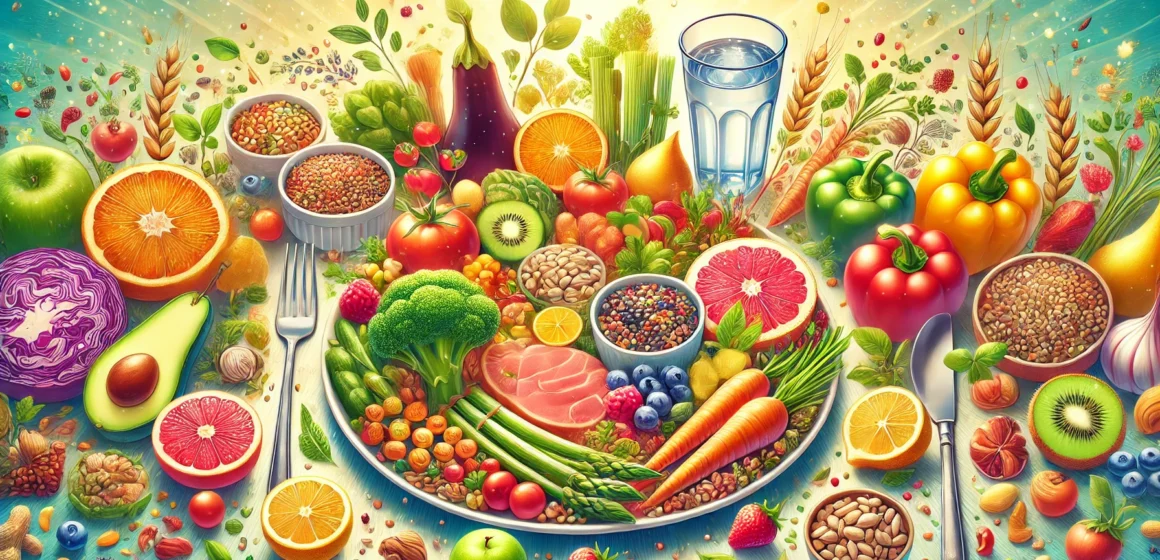The Ultimate Guide to Healthy Eating and Nourishing Your Body
Eating healthy is more than just a trend—it’s a lifestyle that fuels your body, boosts your energy, and improves your overall well-being. Whether you want to lose weight, gain energy, or simply feel better, making the right food choices can have a huge impact. In this ultimate guide, we’ll explore what healthy eating truly means, the benefits it offers, and how you can incorporate nutritious foods into your daily routine.

What is Healthy Eating?
Healthy eating is about consuming a balanced diet rich in essential nutrients that support your body’s functions. It includes whole foods like fruits, vegetables, lean proteins, whole grains, and healthy fats while limiting processed foods, added sugars, and unhealthy fats.
Healthy eating is not about strict dieting, deprivation, or following unrealistic rules. Instead, it’s about making sustainable choices that nourish your body and mind while still allowing room for flexibility and enjoyment.
The Benefits of Healthy Eating
Eating nutritious foods has a profound effect on your overall health. Here are some key benefits:
1. Boosts Energy Levels
The right foods provide your body with steady energy throughout the day. Whole grains, lean proteins, and healthy fats keep your blood sugar levels stable, preventing crashes and fatigue.
2. Strengthens the Immune System
A diet rich in vitamins, minerals, and antioxidants helps strengthen your immune system, reducing the risk of illness and infections. Foods like citrus fruits, leafy greens, and nuts are excellent for immunity.
3. Supports Healthy Digestion
Fiber-rich foods like whole grains, legumes, fruits, and vegetables promote good digestion and prevent issues like bloating and constipation.
4. Helps with Weight Management
Eating nutritious, filling foods can help with weight loss or maintenance by keeping you full for longer and preventing unhealthy cravings.
5. Reduces the Risk of Chronic Diseases
A healthy diet lowers the risk of heart disease, diabetes, high blood pressure, and other chronic conditions by reducing inflammation and maintaining stable blood sugar levels.
6. Improves Mental Health
Food plays a crucial role in brain function. Omega-3 fatty acids, B vitamins, and antioxidants found in healthy foods support mood, memory, and mental clarity.
Key Nutrients Your Body Needs
To maintain good health, your body needs a variety of essential nutrients. Here are the key ones and where to find them:
1. Protein
Why you need it: Builds and repairs tissues, supports muscle health, and keeps you full.
Best sources: Lean meats, fish, eggs, tofu, beans, lentils, nuts, and dairy products.
2. Carbohydrates
Why you need it: The body’s main energy source. Focus on complex carbs for long-lasting energy.
Best sources: Whole grains (brown rice, quinoa, oats), fruits, vegetables, and legumes.
3. Healthy Fats
Why you need it: Supports brain function, hormone production, and heart health.
Best sources: Avocados, nuts, seeds, olive oil, fatty fish, and coconut oil.
4. Vitamins and Minerals
Why you need them: Support immune function, bone health, and overall body processes.
Best sources: Fruits, vegetables, nuts, seeds, dairy, and whole grains.
5. Fiber
Why you need it: Aids digestion, promotes gut health, and helps with weight management.
Best sources: Whole grains, legumes, vegetables, fruits, and seeds.
6. Water
Why you need it: Keeps your body hydrated, regulates temperature, and aids digestion.
Best sources: Water-rich foods like cucumbers, watermelon, oranges, and herbal teas.
How to Create a Healthy Meal Plan
Planning meals in advance helps you stay on track with your nutrition goals. Follow these steps to build a well-balanced diet:
1. Follow the Plate Method
A simple way to structure your meals is by dividing your plate:
- 50% vegetables and fruits (leafy greens, berries, carrots, etc.)
- 25% lean proteins (chicken, fish, tofu, beans)
- 25% whole grains (brown rice, quinoa, whole wheat bread)
2. Include a Variety of Foods
Eating a variety of foods ensures you get all the essential nutrients. Try to eat different colors of fruits and vegetables each day.
3. Prioritize Whole Foods Over Processed Foods
Choose natural, whole foods over packaged or fast food, which often contain unhealthy additives.
4. Stay Hydrated
Drink at least 8 glasses of water daily to support digestion, circulation, and overall health.
5. Plan and Prepare Meals in Advance
Prepping meals ahead of time helps you make healthier choices, saves time, and prevents last-minute unhealthy eating.
Healthy Eating Tips for Every Lifestyle
No matter how busy you are, these simple tips can help you maintain a healthy diet:
For Busy Professionals
- Pack healthy snacks like nuts, yogurt, or fruit for on-the-go nutrition.
- Meal prep on weekends to have ready-to-eat meals during the week.
- Choose balanced meals when eating out by opting for lean proteins and vegetables.
For Families
- Get kids involved in meal preparation to encourage healthy eating habits.
- Make meals fun by creating colorful plates with different fruits and vegetables.
- Opt for homemade meals instead of processed foods.
For Fitness Enthusiasts
- Eat protein-rich meals to support muscle recovery and growth.
- Hydrate before and after workouts with water or electrolyte-rich drinks.
- Choose complex carbs like oats and sweet potatoes for sustained energy.
For Vegetarians and Vegans
- Ensure you get enough protein from plant-based sources like lentils, beans, tofu, and quinoa.
- Include fortified foods or supplements for essential nutrients like vitamin B12 and omega-3s.
- Eat a variety of colorful fruits and vegetables to get all essential vitamins.
Common Myths About Healthy Eating
1. Eating Healthy is Expensive
Eating healthy can be affordable if you focus on whole foods like grains, beans, and seasonal vegetables instead of processed health foods.
2. Carbs Are Bad for You
Not all carbs are bad! Whole grains, fruits, and vegetables provide essential nutrients and fiber.
3. You Have to Give Up Your Favorite Foods
Healthy eating is about balance. You can still enjoy your favorite foods in moderation while focusing on nutrient-dense meals.

Final Thoughts
Healthy eating is not about following strict rules—it’s about nourishing your body with wholesome foods that help you feel your best. By making simple changes like incorporating more whole foods, drinking enough water, and planning balanced meals, you can create a sustainable and enjoyable healthy lifestyle.



Leave a Reply